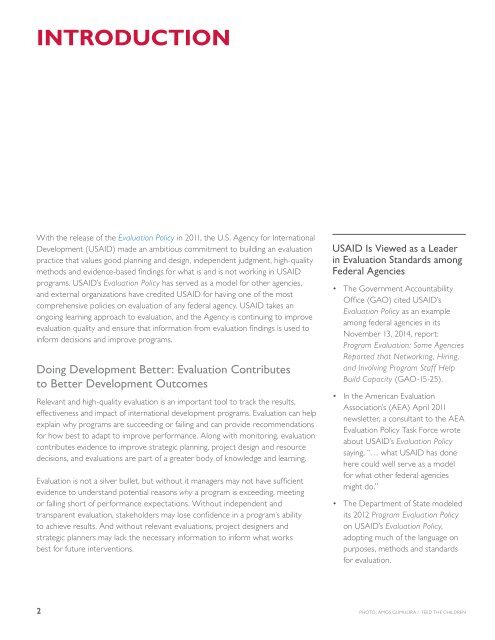STRENGTHENING EVIDENCE-BASED DEVELOPMENT
EvaluationPolicyFiveYearReport
EvaluationPolicyFiveYearReport
Create successful ePaper yourself
Turn your PDF publications into a flip-book with our unique Google optimized e-Paper software.
INTRODUCTION <br />
With the release of the Evaluation Policy in 2011, the U.S. Agency for International<br />
Development (USAID) made an ambitious commitment to building an evaluation<br />
practice that values good planning and design, independent judgment, high-quality<br />
methods and evidence-based findings for what is and is not working in USAID<br />
programs. USAID’s Evaluation Policy has served as a model for other agencies,<br />
and external organizations have credited USAID for having one of the most<br />
comprehensive policies on evaluation of any federal agency. USAID takes an<br />
ongoing learning approach to evaluation, and the Agency is continuing to improve<br />
evaluation quality and ensure that information from evaluation findings is used to<br />
inform decisions and improve programs.<br />
Doing Development Better: Evaluation Contributes<br />
to Better Development Outcomes<br />
Relevant and high-quality evaluation is an important tool to track the results,<br />
effectiveness and impact of international development programs. Evaluation can help<br />
explain why programs are succeeding or failing and can provide recommendations<br />
for how best to adapt to improve performance. Along with monitoring, evaluation<br />
contributes evidence to improve strategic planning, project design and resource<br />
decisions, and evaluations are part of a greater body of knowledge and learning.<br />
Evaluation is not a silver bullet, but without it managers may not have sufficient<br />
evidence to understand potential reasons why a program is exceeding, meeting<br />
or falling short of performance expectations. Without independent and<br />
transparent evaluation, stakeholders may lose confidence in a program’s ability<br />
to achieve results. And without relevant evaluations, project designers and<br />
strategic planners may lack the necessary information to inform what works<br />
best for future interventions.<br />
USAID Is Viewed as a Leader<br />
in Evaluation Standards among<br />
Federal Agencies<br />
• The Government Accountability<br />
Office (GAO) cited USAID’s<br />
Evaluation Policy as an example<br />
among federal agencies in its<br />
November 13, 2014, report:<br />
Program Evaluation: Some Agencies<br />
Reported that Networking, Hiring,<br />
and Involving Program Staff Help<br />
Build Capacity (GAO-15-25).<br />
• In the American Evaluation<br />
Association’s (AEA) April 2011<br />
newsletter, a consultant to the AEA<br />
Evaluation Policy Task Force wrote<br />
about USAID’s Evaluation Policy<br />
saying, “… what USAID has done<br />
here could well serve as a model<br />
for what other federal agencies<br />
might do.”<br />
• The Department of State modeled<br />
its 2012 Program Evaluation Policy<br />
on USAID’s Evaluation Policy,<br />
adopting much of the language on<br />
purposes, methods and standards<br />
for evaluation.<br />
2<br />
PHOTO: AMOS GUMULIRA / FEED THE CHILDREN


